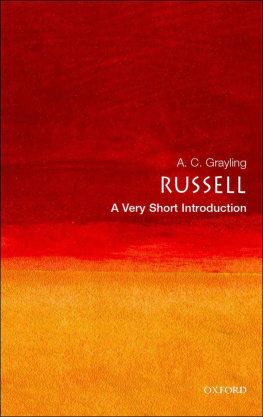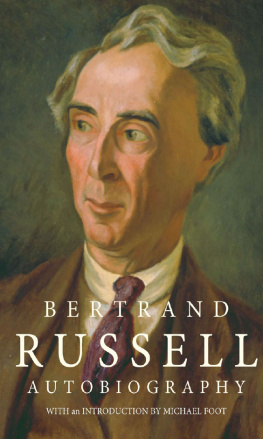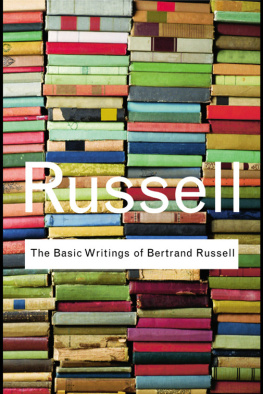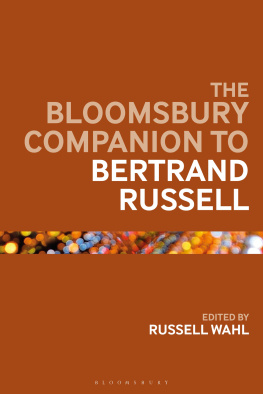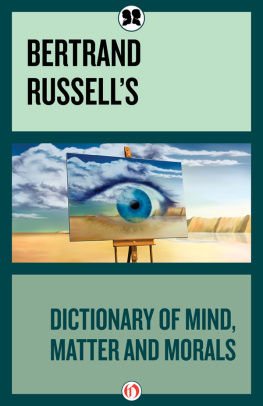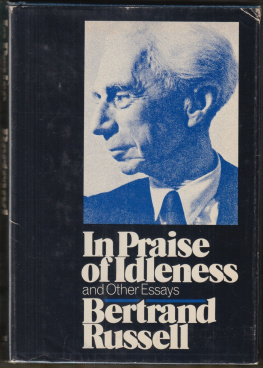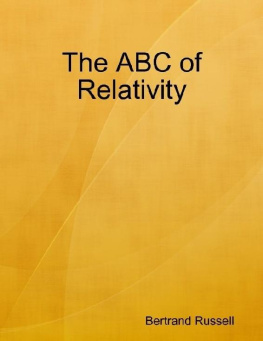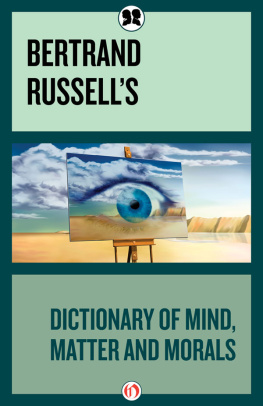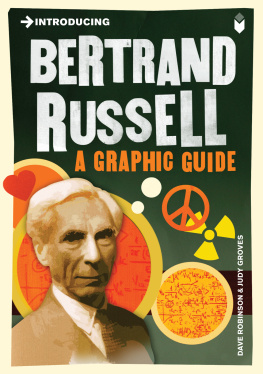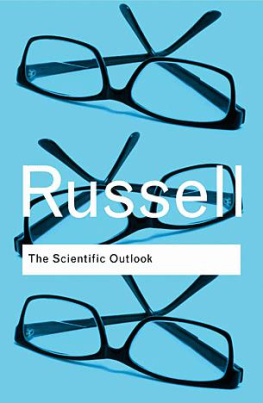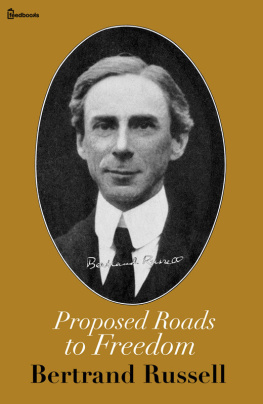Russell Bertrand - The Analysis of the Mind
Here you can read online Russell Bertrand - The Analysis of the Mind full text of the book (entire story) in english for free. Download pdf and epub, get meaning, cover and reviews about this ebook. genre: Science. Description of the work, (preface) as well as reviews are available. Best literature library LitArk.com created for fans of good reading and offers a wide selection of genres:
Romance novel
Science fiction
Adventure
Detective
Science
History
Home and family
Prose
Art
Politics
Computer
Non-fiction
Religion
Business
Children
Humor
Choose a favorite category and find really read worthwhile books. Enjoy immersion in the world of imagination, feel the emotions of the characters or learn something new for yourself, make an fascinating discovery.
- Book:The Analysis of the Mind
- Author:
- Genre:
- Rating:3 / 5
- Favourites:Add to favourites
- Your mark:
- 60
- 1
- 2
- 3
- 4
- 5
The Analysis of the Mind: summary, description and annotation
We offer to read an annotation, description, summary or preface (depends on what the author of the book "The Analysis of the Mind" wrote himself). If you haven't found the necessary information about the book — write in the comments, we will try to find it.
The Analysis of the Mind — read online for free the complete book (whole text) full work
Below is the text of the book, divided by pages. System saving the place of the last page read, allows you to conveniently read the book "The Analysis of the Mind" online for free, without having to search again every time where you left off. Put a bookmark, and you can go to the page where you finished reading at any time.
Font size:
Interval:
Bookmark:
The Project Gutenberg EBook of The Analysis of Mind, by Bertrand Russell
This eBook is for the use of anyone anywhere at no cost and with
almost no restrictions whatsoever. You may copy it, give it away or
re-use it under the terms of the Project Gutenberg License included
with this eBook or online at www.gutenberg.org
Title: The Analysis of Mind
Author: Bertrand Russell
Commentator: H. D. Lewis
Release Date: December 6, 2008 [EBook #2529]
Language: English
*** START OF THIS PROJECT GUTENBERG EBOOK THE ANALYSIS OF MIND ***
Produced by Dianne Bean, and David Widger
An admirable statement of the aims of the Library of Philosophy was provided by the first editor, the late Professor J. H. Muirhead, in his description of the original programme printed in Erdmann's History of Philosophy under the date 1890. This was slightly modified in subsequent volumes to take the form of the following statement:
"The Muirhead Library of Philosophy was designed as a contribution to the History of Modern Philosophy under the heads: first of Different Schools of ThoughtSensationalist, Realist, Idealist, Intuitivist; secondly of different SubjectsPsychology, Ethics, Aesthetics, Political Philosophy, Theology. While much had been done in England in tracing the course of evolution in nature, history, economics, morals and religion, little had been done in tracing the development of thought on these subjects. Yet 'the evolution of opinion is part of the whole evolution'.
"By the co-operation of different writers in carrying out this plan it was hoped that a thoroughness and completeness of treatment, otherwise unattainable, might be secured. It was believed also that from writers mainly British and American fuller consideration of English Philosophy than it had hitherto received might be looked for. In the earlier series of books containing, among others, Bosanquet's "History of Aesthetic," Pfleiderer's "Rational Theology since Kant," Albee's "History of English Utilitarianism," Bonar's "Philosophy and Political Economy," Brett's "History of Psychology," Ritchie's "Natural Rights," these objects were to a large extent effected.
"In the meantime original work of a high order was being produced both in England and America by such writers as Bradley, Stout, Bertrand Russell, Baldwin, Urban, Montague, and others, and a new interest in foreign works, German, French and Italian, which had either become classical or were attracting public attention, had developed. The scope of the Library thus became extended into something more international, and it is entering on the fifth decade of its existence in the hope that it may contribute to that mutual understanding between countries which is so pressing a need of the present time."
The need which Professor Muirhead stressed is no less pressing to-day, and few will deny that philosophy has much to do with enabling us to meet it, although no one, least of all Muirhead himself, would regard that as the sole, or even the main, object of philosophy. As Professor Muirhead continues to lend the distinction of his name to the Library of Philosophy it seemed not inappropriate to allow him to recall us to these aims in his own words. The emphasis on the history of thought also seemed to me very timely; and the number of important works promised for the Library in the very near future augur well for the continued fulfilment, in this and other ways, of the expectations of the original editor.
H. D. Lewis
This book has grown out of an attempt to harmonize two different tendencies, one in psychology, the other in physics, with both of which I find myself in sympathy, although at first sight they might seem inconsistent. On the one hand, many psychologists, especially those of the behaviourist school, tend to adopt what is essentially a materialistic position, as a matter of method if not of metaphysics. They make psychology increasingly dependent on physiology and external observation, and tend to think of matter as something much more solid and indubitable than mind. Meanwhile the physicists, especially Einstein and other exponents of the theory of relativity, have been making "matter" less and less material. Their world consists of "events," from which "matter" is derived by a logical construction. Whoever reads, for example, Professor Eddington's "Space, Time and Gravitation" (Cambridge University Press, 1920), will see that an old-fashioned materialism can receive no support from modern physics. I think that what has permanent value in the outlook of the behaviourists is the feeling that physics is the most fundamental science at present in existence. But this position cannot be called materialistic, if, as seems to be the case, physics does not assume the existence of matter.
The view that seems to me to reconcile the materialistic tendency of psychology with the anti-materialistic tendency of physics is the view of William James and the American new realists, according to which the "stuff" of the world is neither mental nor material, but a "neutral stuff," out of which both are constructed. I have endeavoured in this work to develop this view in some detail as regards the phenomena with which psychology is concerned.
My thanks are due to Professor John B. Watson and to Dr. T. P. Nunn for reading my MSS. at an early stage and helping me with many valuable suggestions; also to Mr. A. Wohlgemuth for much very useful information as regards important literature. I have also to acknowledge the help of the editor of this Library of Philosophy, Professor Muirhead, for several suggestions by which I have profited.
The work has been given in the form of lectures both in London and Peking, and one lecture, that on Desire, has been published in the Athenaeum.
There are a few allusions to China in this book, all of which were written before I had been in China, and are not intended to be taken by the reader as geographically accurate. I have used "China" merely as a synonym for "a distant country," when I wanted illustrations of unfamiliar things.
Peking, January 1921.
PREFACE
THE ANALYSIS OF MIND
| LECTURE I. | RECENT CRITICISMS OF "CONSCIOUSNESS" |
| LECTURE II. | INSTINCT AND HABIT |
| LECTURE III. | DESIRE AND FEELING |
| LECTURE IV. | INFLUENCE OF PAST HISTORY ON PRESENT OCCURRENCES IN LIVING |
| LECTURE V. | PSYCHOLOGICAL AND PHYSICAL CAUSAL LAWS |
| LECTURE VI. | INTROSPECTION |
| LECTURE VII. | THE DEFINITION OF PERCEPTION |
| LECTURE VIII. | SENSATIONS AND IMAGES |
| LECTURE IX. | MEMORY |
| LECTURE X. | WORDS AND MEANING |
| LECTURE XI. | GENERAL IDEAS AND THOUGHT |
| LECTURE XII. | BELIEF |
| LECTURE XIII. | TRUTH AND FALSEHOOD |
| LECTURE XIV. | EMOTIONS AND WILL |
| LECTURE XV. | CHARACTERISTICS OF MENTAL PHENOMENA |
There are certain occurrences which we are in the habit of calling "mental." Among these we may take as typical BELIEVING and DESIRING. The exact definition of the word "mental" will, I hope, emerge as the lectures proceed; for the present, I shall mean by it whatever occurrences would commonly be called mental.
I wish in these lectures to analyse as fully as I can what it is that really takes place when we, e.g. believe or desire. In this first lecture I shall be concerned to refute a theory which is widely held, and which I formerly held myself: the theory that the essence of everything mental is a certain quite peculiar something called "consciousness," conceived either as a relation to objects, or as a pervading quality of psychical phenomena.
Font size:
Interval:
Bookmark:
Similar books «The Analysis of the Mind»
Look at similar books to The Analysis of the Mind. We have selected literature similar in name and meaning in the hope of providing readers with more options to find new, interesting, not yet read works.
Discussion, reviews of the book The Analysis of the Mind and just readers' own opinions. Leave your comments, write what you think about the work, its meaning or the main characters. Specify what exactly you liked and what you didn't like, and why you think so.


